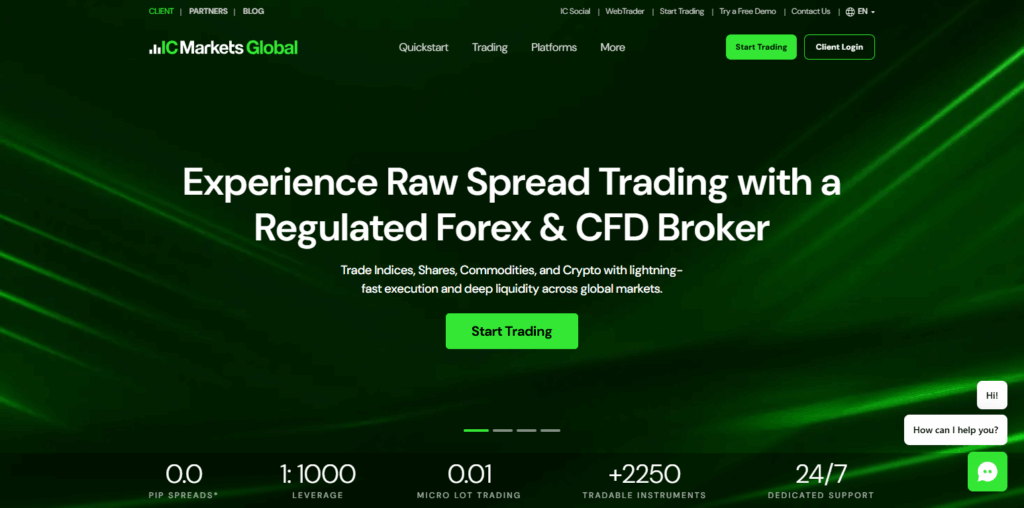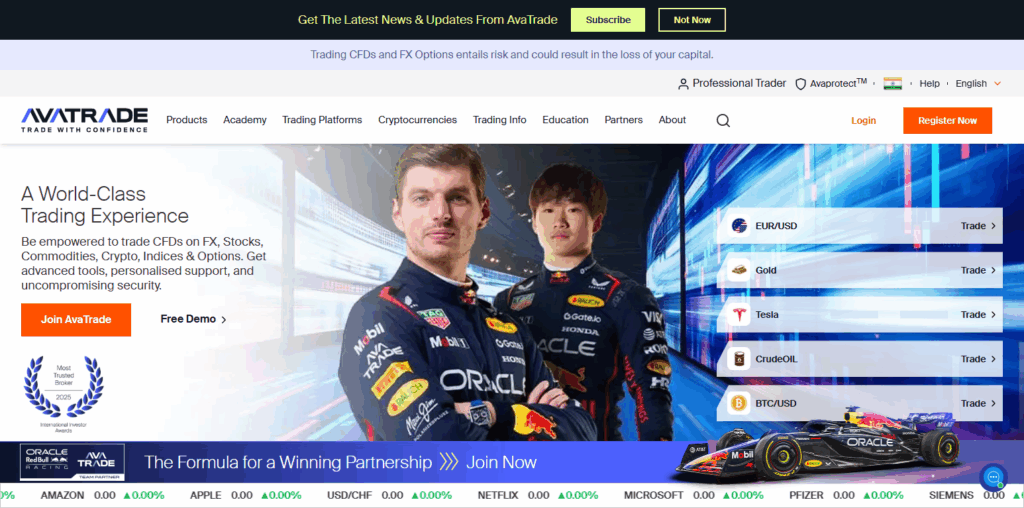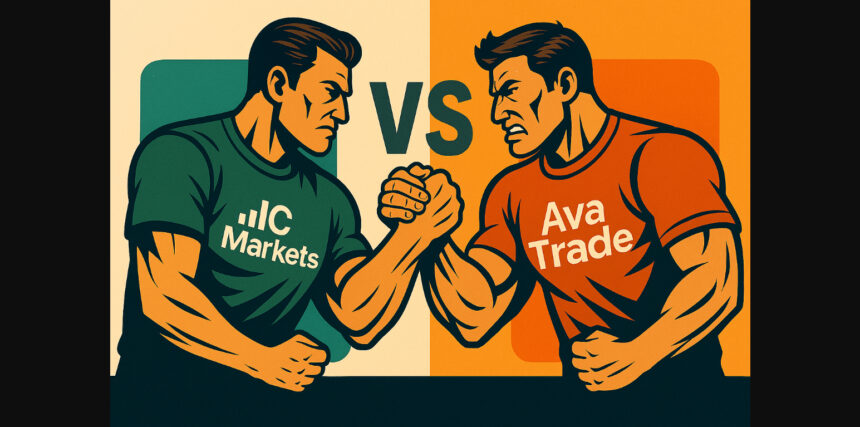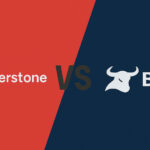Selecting a suitable forex broker can really affect one’s trading success, especially when IC Markets and AvaTrade are under consideration; both brokers being evenly matched. They are both well-regulated, provide competitive trading conditions and access to global financial markets.
The distinct differences show when their pricing models, platforms and trader-centric services are compared. This is why I have chosen to explain IC Markets and AvaTrade in detail from differing perspectives so that you can select the one that best suits your trading needs.
What Is IC Markets?
IC Markets is regarded as an international forex and CFDs broker with an attractive offer of reduced spreads and rapid execution of orders while providing advanced trading environments.
Founded in Australia in 2007, the company provides trading in various instruments like currencies, indices, commodities, and gold as well as digitally traded securities.

IC Markets is compatible with the trading platforms Meta Trader 4, Meta Trader 5, and cTrader, designed for novice and experienced traders alike.
As for the safety of the funds and the reliability of the trading services, they are supervised by the most important authorities in the world like ASIC, CySEC and FSA.
What Is AvaTrade?
AvaTrade, a forex and CFD broker providing traders with access to numerous markets including currencies, stocks, commodities, indices, and cryptocurrencies, was established in 2006 and is a recommended broker in many countries.

AvaTrade is easy to use as trading platforms include MetaTrader 4, MetaTrader 5, WebTrader, and the proprietary AvaTradeGO app. AvaTrade is positively-reviewed as they are licensed by several regulators.
Also, their educational resources, automated trading, and varying competitive fixed and floating spreads make the broker highly attractive to beginners as well as experienced traders as all traders want reliable online trading conditions. AvaTrade is highly likely to meet your online trading needs.
Key Point of AvaTrade vs IC Markets:
| Feature | AvaTrade | IC Markets |
|---|---|---|
| Headquarters | Ireland | Australia |
| Regulators | ASIC, BVI, Central Bank of Ireland, FFAJ, FSCA, KNF, MiFID | ASIC, CySEC, FSA |
| Tier 1 Regulator(s)? | ✅ Yes | ✅ Yes |
| Owned by Public Company? | No | No |
| Year Established | 2006 | 2010 |
| Execution Type(s) | Market Maker | ECN/STP |
| Minimum Deposit | $100 | $200 |
| Negative Balance Protection | ✅ Yes | N/A |
| Trading Platform(s) | MT4, MT5, WebTrader, AvaTradeGO (proprietary), Others | MT4, MT5, cTrader |
| Average Trading Cost EUR/USD | 0.9 pips | 0.0 pips ($0.00) |
| Average Trading Cost GBP/USD | 1.5 pips | 0.0 pips ($0.00) |
| Average Trading Cost WTI Crude Oil | $0.03 | $0.03 |
| Average Trading Cost Gold | $0.29 | $0.05 |
| Retail Loss Rate | 77.82% | N/A |
| Minimum Raw Spreads | Not applicable | N/A |
| Minimum Standard Spreads | 0.9 pips | N/A |
| Minimum Commission for Forex | Commission-free | N/A |
Trading Platforms and Tools
Both AvaTrade and IC Markets offer easy-to-use trading platforms and environments that come with free demo accounts, and access to MetaTrader 4 and 5 on the web and Windows desktops. Chart-based trading, copy trading, and algorithmic trading are also available.
The key distinction is the range of trading platforms since AvaTrade has more flexibility in terms of proprietary technologies, like EvaTradeGO and WebTrader, while IC Markets is more focused on third party technologies like MT4, MT5, and cTrader.
In terms of reputation, AvaTrade has a more favorable reputation with ForexBrokers.com, scoring 4.5 stars and ranked #13 of 63 brokers, and IC Markets is rated 4 stars and ranked #16. If you like using an in-house platform, AvaTrade is better, or if you want to use MetaTrader and cTrader, then IC Markets is better.
IC Markets vs AvaTrade : Features
IC Markets – Features
- Regulated by ASIC, CySEC, and FSA ensuring strong global oversight and trader protection.
- Offers 2,150+ instruments across forex, commodities, indices, bonds, stocks, futures, and cryptocurrencies.
- Minimum deposit requirement is $200 or the equivalent for account opening.
- Leverage up to 1:1000 under FSA regulation with lower caps under ASIC and CySEC.
- Provides Standard and Raw accounts on MetaTrader 4, MetaTrader 5, and cTrader platforms.
- Standard account spreads start from 0.8 pips, suitable for commission-free trading.
- Raw accounts charge $3.00–$3.50 per lot per side with the lowest spreads.
- PAMM and MAM investment account services are currently unavailable.
- Scalping strategies are fully permitted without restrictions.
- News trading is allowed for high-volatility opportunities.
- Automated trading with robots and EAs is supported.
AvaTrade – Features
- 1,250+ trading assets including forex, stocks, commodities, indices, ETFs, and options.
- Maximum leverage 1:30 for EU, UK, Australia and up to 1:400 for global clients.
- Lower minimum deposit requirement of only $100 for new traders.
- You can choose between two account types: Retail and Professional, designed for seasoned traders.
- For Forex, spreads start at 0.9 pips and there are no additional commission fees.
- Fund managers and strategy providers can access our MAM account solutions.
- Currently, we do not provide PAMM services.
- Scalping and other rapid, short-term trading methods are permitted.
- You can trade during news events, although spreads might widen during significant events.
- Automated trading using expert advisors and trading robots is allowed.
Regulatory Framework and Safety
Ensuring safe and secure trading environments has been a top priority for both AvaTrade and IC Markets, given the stringent regulations both brokers work under.
IC Markets has earned trust from regulators like the FSA, ASIC and CySEC. This means high transparent accounts and good safety for the accounts’ funds. With a high focus on ECNs and direct market access, competitive pricing means a lot to professional traders.
AvaTrade also has earned trust from regulators like the Central Bank of Ireland, ASIC and the FCA of the UK. With these multiple authorities, the enforcement has been strong around compliance, safety of funds, and strong investor protection, crossing multiple jurisdictions.
Both brokers rate very high on the regulations’ strength. IC Markets has a very small edge on traders focused on institutional grade execution and access to wider markets.
Trading Costs and Spreads
| Cost & Fees Category | AvaTrade | IC Markets |
|---|---|---|
| Average Spread – EUR/USD | 0.9 pips | 0.0 pips ($0.00) |
| Average Spread – GBP/USD | 1.5 pips | 0.0 pips ($0.00) |
| WTI Crude Oil Cost | $0.03 | $0.03 |
| Gold Trading Cost | $0.29 | $0.05 |
| Bitcoin Trading Cost | $39 | $12.47 |
| Minimum Raw Spreads | Not applicable | 0.0 pips |
| Minimum Standard Spreads | 0.9 pips | N/A |
| Forex Commission | Commission-free | N/A on Standard (Commission on Raw Accounts) |
| Deposit Fee | None | None |
| Withdrawal Fee | None | None |
| Inactivity Fee | $50 quarterly after 3 months | None |
Your selection of a broker entails considering trading costs, especially for active and high-volume traders.
IC Markets offers ultra-tight spreads for its ECN accounts with spreads from 0.0 pips during commissions. This structure benefits scalpers and algorithmic traders, who depend on low-cost trading and high execution speed.
AvaTrade’s commission-free spreads on varying instruments are certainly competitive, although generally slightly wider than those of IC Markets. This especially applies to traders requiring simplicity and wider asset range, while those needing minimal spreads will find IC Markets cheaper.
Account Types and Funding Options
Both experience levels and varying subscription levels are targeted by each broker, with multiple accounts, also covered by various methods to deposit funds for trading.
IC Markets accounts are Standard, Raw Spread (ECN), and Islamic, which also has low deposit requirements, provides flexibility for traders to select accounts allowing commission-free and low-spread ECN which is ideal for beginners to advanced day traders.
AvaTrade account options consist of Retail, Professional and Demo accounts. Supporting a large range of markets and offering funding options through cards, bank transfers and e-wallets, definitely makes AvaTrade a viable choice for traders who want a diversified portfolio and simple account management.
Customer Support and Educational Resources
Solid support and education tools are vital for developing confidence and improving trading performance.
IC Market sets 24/5 customer support through live chat, email, and phone, and also provides webinars and other market analysis tools. Education materials primarily focus on advanced traders, assuming a firm grasp of fundamental market components.
AvaTrade provides outstanding educational support with training videos, step-by-step guides, webinars, and multilingual resources that are catered to beginner and intermediate traders who seek to improve their trading proficiency in a safe environment.
Pros & Cons comparison for IC Markets and AvaTrade:
IC Markets
Pros:
- Very low and tight spreads which is very favorable to high-volume and scalping traders.
- Powerful platforms (MT4, MT5, cTrader) and a wide selection of instruments (forex, commodities, indexes, stocks, crypto) to trade.
- High quality regulation (ASIC, CySEC, FSA) and well secured.
- No withdrawal or inactivity fees and most of the funding options are free.
Cons:
- Minimum deposit requirement is higher, at $200, compared to most competitors.
- Less robust educational resources and proprietary platform offering compared to some brokers.
- More complex for beginner traders are some platforms and account types.
- Less flexible bonuses and leverage offers in most highly regulated jurisdictions.—
AvaTrade
Pros:
- Good variety of trading options and asset classes (forex, stocks, ETFs, options).
- Minimum deposit is only $100 and platforms including a proprietary app are easy to navigate.
- Multiple jurisdictions with client protections and strong regulatory oversight.
- For those new to trading, it has outstanding educational materials and guidance.
Cons:
- Wide spreads and trading costs in comparison to ECN brokers with ultra-low costs.
- Limited ultra-low cost trading options due to lack of raw spread ECN accounts.
- Account inactivity is subject to fees (e.g., quarterly fees).
- Compared to niche brokers, ultra-high frequency, and algorithmic trading tools seem limited as somewhat advanced traders.
Conclusion
Both IC Markets and AvaTrade are compelling brokerage options, appealing to diverse preferences. IC Markets supports deep discounted traders, scalpers and algo traders due to its ultra-low spreads, ECN execution, rapid trade processing, and focus on cost efficiency.
Conversely, AvaTrade shines in its relative simplicity coming in with low minimums, solid educational support and diverse platform options appealing to beginners and those with more complex, multi-layered portfolio and investment strategies.
FAQ
Which broker is better for beginners: IC Markets or AvaTrade?
AvaTrade is generally better for beginners due to its user-friendly platforms, strong educational resources, and lower minimum deposit. IC Markets may feel more suitable for advanced and high-frequency traders.
Which broker has lower trading costs?
IC Markets offers lower spreads—starting from 0.0 pips on Raw accounts—making it ideal for scalpers and active traders. AvaTrade has wider spreads but offers commission-free trading.
Are both brokers regulated and safe?
Yes. IC Markets is regulated by ASIC, CySEC, and FSA, while AvaTrade is regulated by multiple global authorities including the Central Bank of Ireland and ASIC. Both provide strong client fund protection.
Do both brokers support MetaTrader 4 and MetaTrader 5?
Yes, both IC Markets and AvaTrade support MT4 and MT5 on desktop and mobile. IC Markets also offers cTrader, while AvaTrade provides its own AvaTradeGO platform.
Which broker offers higher leverage?
IC Markets provides leverage up to 1:1000 in offshore jurisdictions. AvaTrade offers up to 1:400 for global clients, but only 1:30 in EU/UK/AU regions due to regulations.









